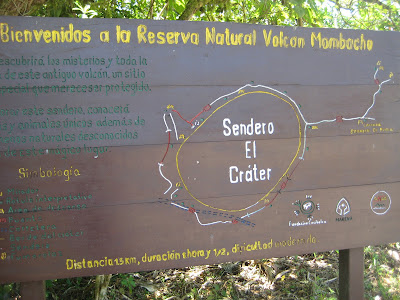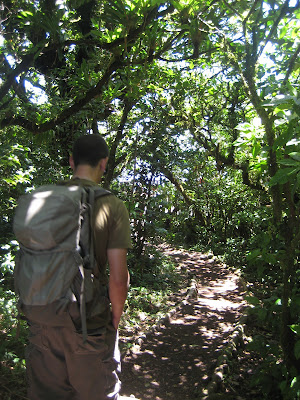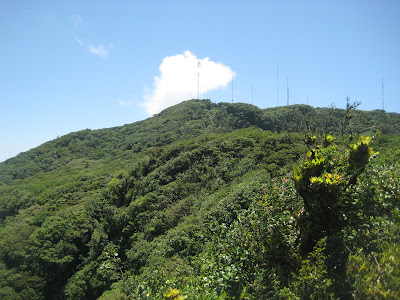I wrote a reflection for my research project, just to keep things updated, and I felt like reflecting on my service so far. Sorry if some things are repeated for those devoted blog readers! Take a deep breath; it's a long one!
Looking back through my blog entries and personal reflections over the past 19 ½ months here in Nicaragua, I have seen many changes in my perspectives and definite growth in many areas. I feel like a lot of people join Peace Corps hoping to change or improve the lives of the host country nationals where they will live, but end up doing so much more than that. I think a very important part of Peace Corps service is learning about yourself and how you fit into the world. We are, as individuals, so small and insignificant, but what we can do is incredible when we learn from other cultures and open our eyes to new perspectives. I don’t necessarily agree with everything or follow everything that Nicaraguans do, or other PCVs for that matter, but I respect them and have a more open mind about different opinions and different ways of life.
In the United States, we tend to get stuck in our own little bubbles, fulfilling our own needs and helping those in direct connection with ourselves. It takes a lot to step out of our comfort zones and be uncomfortable in order to serve others. This doesn’t necessarily have to be Peace Corps, but it definitely fits the bill.
When I was enrolling in Peace Corps, I was excited to go somewhere I had never been, and never really thought about before. It was exciting and adventurous, and totally not something people expected me to do. I even surprised myself. I think I was sort of in a daze leading up to leaving and then when I was saying goodbye to my parents at the airport, it suddenly hit me that I was saying goodbye to them and I might not see them for 2 years. What the heck was I thinking? I didn’t know anybody who was going and I didn’t know where I was going to live. Can I get out now?
I remember having mixed feelings in Washington DC for staging, but having friendly people around talking to me really did ease my anxiety. Arriving in Nicaragua and training was very difficult, physically and emotionally. But, I made it through and entered into my service, which only led to a bigger roller coaster ride.
It’s difficult to work with people who have such different experiences than you do, especially with the cultural differences woven in. Not only were my counterpart teachers male, and several years older than me, they grew up in a completely different world and had significantly different expectations of what a classroom and a lesson plan should look like. This was of course difficult and what I wanted in the beginning was to build trust and gain respect. I wanted them to know that I was bringing new, innovative ways to help improve their teaching and to increase student motivation. I think I jumped the gun though and this led to a lot of frustration in the beginning. You can’t just go into someone’s niche and tell them that the way they’ve been doing it (as well as all the other teachers) for 50+ years is not good and they must listen to you, the young, all-knowing gringo(a) to change and be better. Yeah, that didn’t work. So, patience became my best friend and frustration surely lingered. I tried my best to hang back a little more and then work on modeling certain activities and strategies in order to show how these could work instead of just forcing my counterpart teachers to do something they weren’t used to doing, or didn’t quite understand. This worked out a lot better, but then my teachers wanted me to take over more of the teaching, which really didn’t bother me at first, why I’d love to be the star of the show! But, that’s not really what I’m here for either…
It’s difficult to find a good balance between teaching, modeling, and building confidence in the teachers versus taking over and telling them I can do it better, now you just sit back and watch. Not that I ever said that, but sometimes it was just easier for me to just do the lesson myself because I knew how to do the activity and I was afraid my counterpart teacher was going to mess it up. Uh oh. Enter the perfectionist… That was no good. I needed to look deeper and realize that the point of me being there wasn’t necessarily to change everything and make everything better because it was in such terrible shape and the students and teachers were probably doomed. No, no, no. I was there to give the teachers a new perspective, to open their minds to different teaching strategies, to hopefully make their teaching more dynamic and even easier on them and the students.
It took me awhile to get to this point because first, I had to change my perspectives and realize what my real goal was in this program, and in life. Anywhere I go, or whatever I do, I can’t put my priorities in front of others’ if I want to eventually open their minds to something I would like to do. I realized that it’s so important for me to humble myself and maybe even sit through a few things that frustrate the heck out of me because I so eagerly just want to jump in and “fix” it, and look beyond the situation and into the other person and see what drives their actions. It’s not that the teachers I was/am working with are bad teachers, they just had different training and their education system is very different than the one I grew up in and studied. I’m sure these teachers could go to a U.S. classroom and start listing off things they find silly or arbitrary, but that’s not the point. We have many differences in the way we do things in the classroom, and in general everyday life, but we are still people and we have the abilities to think and create. This is not necessarily something we learn in school, but through these kinds of experiences that stretch us, bend us, break us, and remold us, it’s there that we find understanding and are able to truly relate to others on another level.
Something I noticed in the classroom is that I would try to introduce a different activity or something and my counterparts, or other teachers in the schools would just say that they couldn’t do it because they didn’t have the materials. They might not have had physical materials in the classroom, but what I tried to do was help them to open their minds and think about what resources they did have and how they could use those to work in their classroom. We don’t necessarily have to use what the U.S. does just because it looks fancy and it must work because that’s what they do over there. I realized that by working in a place where classroom materials are very limited that I had been very wasteful back home and that the materials I made in my classrooms here worked just as well and that I didn’t need to print out 50 copies for the students because we could reuse materials over and over again and students could make their own things as well. When you don’t have the resources to make a bazillion copies of some worksheet and you need to write everything out and have students copy, it makes you really conscious about deciding which activities are really important, or if it’s just a filler (time-waster) activity.
Materials design really became my passion throughout working in the classrooms here because I knew that students pay more attention when you bring new things into the classroom, especially if they’re colorful, flashy, or look different. The teachers that I trained were also very responsive to the materials that I was developing (or simply reproducing from other PCVs), which made me happy that it interested them and they wanted to use these things in their classrooms. Sometimes just using yourself as a resource is good enough. Why make flashcards or spend the whole class trying to make beautiful drawings on the board when you can act things out (daily activities) or point to yourself (clothing) or point to things in the classroom (classroom objects). I like to encourage teachers to think before they write. I hate seeing a long list of vocabulary words on the board and students copying and translating because I know they’re not learning. And you know how I know this? Because I was a student once too and that’s just boring and it never helped me to learn vocabulary. I remember making flashcards, pneumonic devices, saying things aloud, acting them out, and doing whatever I could to connect different parts of my brain to make me learn those words. I realized though that maybe I didn’t explain this very well to teachers, maybe I was just stuck in the No! Don’t do that! It doesn’t work! phase and not telling them WHY. But the WHY is so very important because why would we stop doing something that we think works fine just because someone said so? We have to know the reason to understand. It’s also difficult for teachers here to really measure students’ learning because they have so many students and it’s difficult to keep track of each one, even to learn all their names (they usually assign each student a number). I bet that if I were to not only model something different and show how students are more motivated, but also show that they learned the information quicker, teachers would be more willing to maybe put in the extra effort it takes to do something different. Sometimes I feel that I’m a traveling saleswoman and just trying to get teachers to buy into my latest schemes. Ugh. I hope they don’t feel that way.
Working in the schools has been very challenging, but it also has been very rewarding. No matter how frustrating things can get, I try to remember those successes I’ve had along the road and reflect on how much I’ve changed and improved my own outlook on life and teaching. I will always hold in my heart something one of my “adopted” counterpart teachers said.
He was talking to the students about some vocabulary words, one of which was "volunteer". He shared with the students that he used to not like to work for free because he knew that his time and energy was valuable, but after working with me and knowing that there are approximately 200 PCVs in country, as well as other U.S. organizations that send volunteers, he had "changed [his] views". He has been volunteering in my community class that I teach in the evenings and he told his students that he does this because he realized that he wanted to be a part of their learning/education and he was excited to help other people and see them improve.
It's funny because I was thinking about this before he had said this in class as I was talking to another PCV because this teacher works for 2 hours each morning teaching English in the Embassy program (7:45-9:45am), teaches in the elementary school for the rest of the morning (10am-12:15pm), the secondary school in the afternoon (1-6pm), and then, he has been helping me in my evening class for 2 hours, 2 days a week (for free!). I was so thankful for his help and what he brings to the class and I was sharing this with another PCV--I was impressed by his willingness to volunteer and support me in this. I hadn't asked him to do it, but I had mentioned my new community class in his classroom and he asked me if he could participate, which was awesome. It even gave me a little chill in class when he said these things about volunteering and it made me realize that just being a volunteer, not a teacher trainer, not an English teacher, not a college graduate, just a plain old volunteer, that’s what motivated him. Cool.
From this also, one of our students from the Embassy program came to class to help out and share her experience learning English. I was so impressed by her eagerness to help the students with the exercises and she even taught part of the class. She also talked to the community members about the importance of English and how they needed to take responsibility for their own learning. She’s a great student and I wish I could take credit for her, but she really just has a good heart and an unbelievable desire to learn.
These are some things that keep me going when the going gets tough. When I feel like giving up, packing up my things, and heading home (yes, that thought has entered my mind and any PCV that said they never thought that would be lying), memories like these, “success stories” that fill my glass, make me realize that it’s all going to be okay and that in life, not everything goes our way, and not everyone will listen to our ideas. Having friends (and my boyfriend here and my family back home) to support us through whatever the circumstances may be adds loads of encouragement as well, but it also brings its own twists and turns. What would life be without its rough spots, without its challenges? We would be pretty weak and live pretty fluffy lives. That’s not what we were meant to be or live.
My experience so far has definitely been a roller coaster ride, but I have learned so much about the culture and people here, and I have learned a lot about myself and who I want to be. It certainly is life changing and I’m so glad that my service is 2 years and not just one. Living with my host family has been both incredible and awkward, but I wouldn’t trade it for the world. They are my second family and they love me and have included me in all their family gatherings. I mean I’m the godmother of the first grandson. How special is that? I’ve met so many incredible people, host country nationals and other volunteers who have added so much to my adventure. I am so happy to be here, even though I have to take cold showers and sometimes the power goes out for a couple hours or the water runs out for a couple days, and I have to wait at the bus stop for an hour… It’s all part of the experience.












































